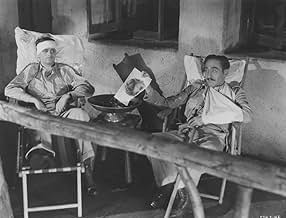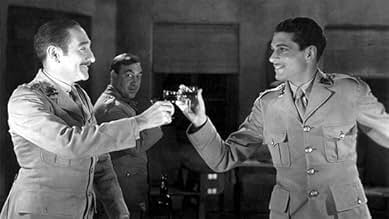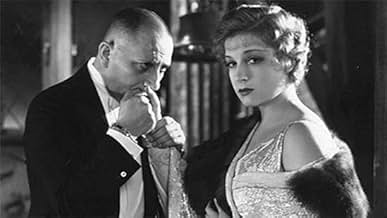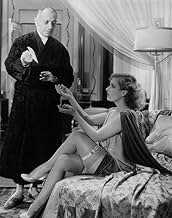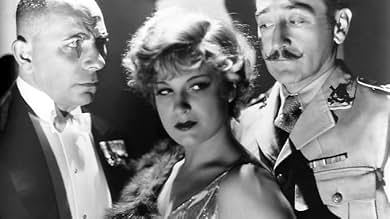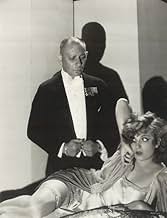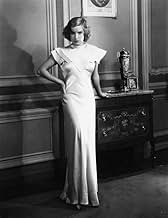Ajouter une intrigue dans votre langueBritish Army Captain Geoff Roberts carries on an affair with Alva, the wife of the cruel Victor Sangrito. Sangrito, however, is well aware of the affair, as he uses his beautiful wife to lur... Tout lireBritish Army Captain Geoff Roberts carries on an affair with Alva, the wife of the cruel Victor Sangrito. Sangrito, however, is well aware of the affair, as he uses his beautiful wife to lure men into romance with her, then blackmailing them to save their careers. When Roberts fa... Tout lireBritish Army Captain Geoff Roberts carries on an affair with Alva, the wife of the cruel Victor Sangrito. Sangrito, however, is well aware of the affair, as he uses his beautiful wife to lure men into romance with her, then blackmailing them to save their careers. When Roberts falls into Sangrito's trap, he pays the blackmail and leaves for India, hoping to forget Alv... Tout lire
- Réalisation
- Scénario
- Casting principal
- General Thomas Armstrong
- (as Frederic Kerr)
- French Maid
- (non crédité)
- Non-com
- (non crédité)
- Party Guest
- (non crédité)
- Bertha - English Barmaid
- (non crédité)
Avis à la une
This aims for an adult sophistication but often comes across more sensationalist and juvenile. Damita's character is barely more than a prostitute, and she gets a nude shower scene and some lingering dressing scenes. Olivier hasn't found his voice yet (this was made during his initial attempt to become a screen star, and before he became a stage triumph back in England), and von Stroheim alternates from reveling in his sadism to barely trying to get through his lines. Menjou is a smooth charmer, as usual. Fans of the performers should take a look, as well as those who enjoy seeing the pre-code boundaries pushed.
Others have already commented on Miss Damita's strengths (beauty and sex appeal) and weaknesses (no real acting ability), which I believe is a fair assessment of her contributions. Despite her physical charms, I found it difficult to believe that men would be driven to extremes of jealousy over her... which seriously undermines the main premise of the story. And when she chooses Adolphe Menjou over Laurence Olivier... well, that's REALLY straining the bounds of credibility!
Speaking of hard to believe, there's Hugh Herbert, making a pathetically inept attempt at a Scottish accent. (He went on to become a repeat offender, once again inflicting his bogus burr as Detective John McTavish in 1934's EASY TO LOVE). Herbert's recurring "business" about the women in his life gets very tiresome very quickly.
The biggest liability in the film is Adolphe Menjou, woefully miscast as the man who wins Damita's heart over all her other lovers, including a very young, very handsome Laurence Olivier. Scrawny, pinch-faced Menjou was over forty at the time (he looks even older); ludicrously, he is repeatedly referred to by various characters as "young man." It's obvious that the part was written for a younger, sexier actor. Had they cast someone more appropriate, the story would have had a lot more sizzle.
Though I rated the film only four stars, I'd recommend it to die-hard film buffs. Besides von Stroheim's memorable characterization, it's got a nuanced performance by the young Olivier, the lovely Miss Damita (and her equally lovely wardrobe), and some appealingly quirky scenes and performances. It's not great art, but it's good entertainment.
Nobody made being evil look as much fun as Stroheim. Von plays the scheming evil husband of Damita who blackmails her lover, Menjou, to do what i can't remember (even though i just watched it - which perhaps says something about the significance of the plot). Von gives this material the seriousness it deserves (not much), which ironically results in his saving the picture. He plays the husband as a broad comedy character, replete with evil laughter. I noticed him almost choking on some of the dialogue its so ridiculous, but there was also some really great fun dialogue in his scenes, which i can't really remember either, except this:
Menjou: Blackmail! Stroheim: Blackmail is such an... ugly word...
Stroheim (explaining why he's just read a love letter addressed to his wife from another man): I am a romantic. I enjoy reading other people's letters, doesn't everybody?
After the first scene when Menjou and Damita are alone together you've totally written the whole movie off as being able to be taken seriously - but when Von Stroheim appears as the malicious husband, which he plays with flair and humour, all of a sudden you feel this wonderfully trashy facade of a film is actually quite fun. And it is - mainly only Von's scenes and those that comedian Hugh Herbert, playing Menjou's servant, are in.
Little-known actress Lili Damita plays the woman every man in this picture is fighting over - and for once, i can understand all the fuss! She's absolutely radiant, really sexy. One of the most beautiful people i've ever seen. She has a racy shower scene where the side of her breast can be seen (i'm not kidding) and a scene where she's getting dressed. These are the luxuries afforded by a pre-code film (1930-1934 i think).
The down side to movies from this period is the cardboard-sets, talk-instead-of-cinema nature of them. Aside from the wonderful films of Lubitsch and anything Carole Lombard is in (and Riefenstahl's The Blue Light, perhaps), films from this period are quite poor. They've thrown away everything that was good about silent pictures, and haven't yet learned how to incorporate dialogue well, so what we have are filmed and edited stage plays.
Watch out for Lawrence Olivier at 24, in his third ever film, who's so slender, high-voiced and camp he's almost feline. This is not a significant film for anyone involved - the only reason it is notable is probably Olivier (if he's your cup of tea), being one of his first movies and probably his first major role.
The studio was unstable bankrupt great depression era Selznick helmed RKO. Director Victor Schertzinger, who had been in film since the first moving frame, pulled poignant performances from his cast and provided the music. DP J. Roy Hunt strapped to RKO through all of its phases provided believable lighting for B/W film through many types of scenes both indoors and out, as well as smooth camera movement and action. Adolphe Menjou survived the silent years to give a decent performance as obsessed, possessed, ardently pining Geoff, Larry Olivier makes his stiff and subtle Hollywood debut in a fair size role as Ned, Lili Damita also from the silent era wasn't a blazing beauty or brilliant actress but she did her part allowing her accent and body to do the rest as Alva, Erich Von Stroheim though a little cheesy made being a sadistic and evil porcelain collector seem lucrative and fun as Victor, and Hugh Herbert as McNellis, trying not to trip over his on and off again accent, bounced through the film offering humor here and there to keep the viewer's emotions connected.
Film making is all about taking the viewer in, cold from the street with their own world in their mind, connecting with their emotions and transporting them to another place and time, taking them on an emotional roller coaster ride until the film is through. If at any time the coaster slows or stops, the viewer has time to realize themselves again, even if only subconsciously, and the film has lost them. If picked up again, the viewer must start over emotionally with the story. Condensing this film down to 68 minutes keeps the viewer's attention the entire time. The overall ride may be short, the sets may be cheap, the acting may not be the best, the plot may be thin, the music may be shallow, the dialog may be simple, but tell a story that efficiently and the viewer doesn't notice while watching. Should the viewer notice, it's not considered long because the next sequence is already speeding along with fresh new things for the brain to process. Plot of the film is simple on the surface though it has a few morality testing twists and turns. For what they had to work with, the plot was kept clean and cohesive, the shots were tight, the camera action was appropriate, the cinematography and lighting was believable, the sets weren't spectacular but scenes didn't last long enough to pick them apart, the tension was there, the emotion was heavy, the beauty was shown, the dialog was believable and the actors sizzled.
So much happens at a comfortable pace that I never once got bored or thought about anything else other than the film. I ignored a ringing phone. I ignored portable electronics. The film was paced so well that I didn't want to look away. I was completely surprised by how enjoyable the film was to watch, unlike so many pre-code early 30s films I have suffered through. (I'm an elitist film snob, so I will watch a terrible film just so I can say w/o any doubt I hated it.) If there is so much fluff in a film that I sit there and start counting how many steps the actress is making across every single room, on every single street, up every single stair and then start counting their stares, far off looks, exaggerated baby spot lit soft shots, and on top of it listen to senseless dialog that does nothing to forward the plot but included just so that the actress/actor is getting a certain percentage of screen time, I feel I'd rather have a root canal without anesthetic rather than sit through the rest of the film. For me to sit through an entire early 30s film without moving or thinking of anything else means the film is very special in some way.
In retrospect, I wonder: the novelty of the talking pictures was new, but it does make me wonder if viewers really loved the long lingering shots of the starlets or if they tolerated them. Did they expect them because they were paying money to be visually entertained? Does length equal value? According to rumor, the film lost $260k at the box office, though IMDBpro, AFI, or BFI don't offer any budget or salary info. Perhaps Friends and Lovers was shot with the same early 30s heavy fluff monkey on its back but given to a gifted editor that said NO to fluff. Regardless, this is a very rare 68 minutes that I was happy watching a pre-code film, and for anyone like me who barely tolerates movies of the early 30s because of the unnecessary fluff, give this one a watch. It's not the best film in the world, but 68 minutes isn't long in comparison to 2 hours of Norma's eyebrows going up and down.
In a supporting role, Erich von Stroheim plays a central European porcelain collector who manipulates his wife into seducing British gentlemen so that he can later blackmail them. It seems a shame that he was not given a bigger part, because he has by far the most interesting character and he gives off the liveliest performance in the film, speaking slowly to toy with Adolphe Menjou, and moving about the place in such a cool, leisurely manner that one is constantly hanging on edge. Unbeknown to him, his plans go awry when it turns out that two of the men that his wife has seduced are old friends; this coincidence is obvious and too slowly played out, but the resulting initial resentment followed by acceptance that occurs between the two men is interesting to track.
The film looks like it may have been intended to be a satire, and the coincidences are sort of funny, however there's nothing comical as such about the film other than von Stroheim's appropriately domineering performance and the way that he talks - how he says "passion" with his accent comes out rather humorously. The film does not quite work as a satire, presenting more so things to think about then any definite message, and the transformations and motivations of Lili Damita's seductress character are never clear and seem a bit awkward. Damita herself is not exactly excellent in her role - she is visually striking, but never as charismatic as a femme fatale should be. The rest of the cast are generally fine, as is the overall production. It just falls a little short of being anything really special.
Le saviez-vous
- AnecdotesSackville Street is part of the Savile Row tailoring area in Mayfair in London. Many people are familiar with the idea of the high quality tailoring in Savile Row. "Savile Row", in terms of tailors, is traditionally regarded as including Savile Row itself and a few of the adjoining streets, such as Sackville Street.
- Citations
[first lines]
Captain Geoffrey 'Geoff' Roberts: I suppose you will hate me... now.
Mrs. Alva Sangrito: Hate you? I love you more than ever.
[He takes her hand as they gaze into each other's eyes]
- ConnexionsFeatured in Great Performances: Laurence Olivier: A Life (1983)
Meilleurs choix
Détails
- Date de sortie
- Pays d’origine
- Langue
- Aussi connu sous le nom de
- The Sphinx Has Spoken
- Lieux de tournage
- Société de production
- Voir plus de crédits d'entreprise sur IMDbPro
- Durée
- 1h 8min(68 min)
- Couleur

